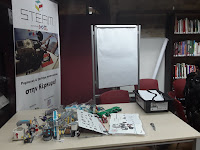Organised by
Wikimedia User Group Greece—in
collaboration with SheSharp, a female-oriented IT group, and the Open
Knowledge Foundation of Greece—the event focused on finding the roots of
these serious issues and coming up with ways to mitigate them.
The main goal was to welcome women, inform them and increase their
participation in the technological and programming fields, in addition
to Wikipedia.
During the event, the audience was divided into two room. In the
first, talks from Greek and international researchers about Wikipedia’s
gender gap were held. Speakers informed the participants about community
projects that women can join to help boost gender diversity, like
Thesswiki,
Wiki Loves Women,
WikiWomenCamp,
Women in Red, and others.
Simultaneously, the second room’s audience attended an editathon
(editing workshop) on the Greek Wikipedia and a hackathon, where
community programmers and volunteers were there to support the
participants. The editathon aimed at creating and translating female
profiles using information from Wikidata and other sources. The
hackathon was more of an introductory developing session where the
participants were given certain programming tasks in Python with an open
part with API and PHP.
At the closing of WikiFemHack, we gave out awards to the participants
with the best contributions including a laptop, an Arduino kit, a usb
stick, free tickets to for Voxxed Days Thessaloniki and more. Near the
end of the event, results from the
Why Women Don’t Edit Wikipedia research about the gender gap in Greece were presented.
WikiFemHack was targeted to designers, scientists, educators,
undergraduate and graduate students with near zero experience in similar
projects. The goal was to inform the participants and for them to
exchange views so we could, through conversation, take a step towards
mitigating the Gender Gap in Technology.
Some of the attendees did not even know they could edit Wikipedia, so
taking the time to explain the projects that were presented in an
informal fashion helped everyone to get a better grasp of the talks that
were hosted.
Everyone had the chance to learn about the policies and code behind
Wikipedia and the other Wikimedia projects, enrich the Greek Wikipedia
with content and also use their coding skills.
WikiFemHack was free to attend, and the organizers provided support
throughout the event and follow-up emails were sent later to help keep
them posted with community updates.
The general feedback was highly positive and the event is most likely
to be repeated next year. WikiFemHack was based on the positive
experience we had in
ThessHack and a gender gap editathon organized by the user group in 2016.




















